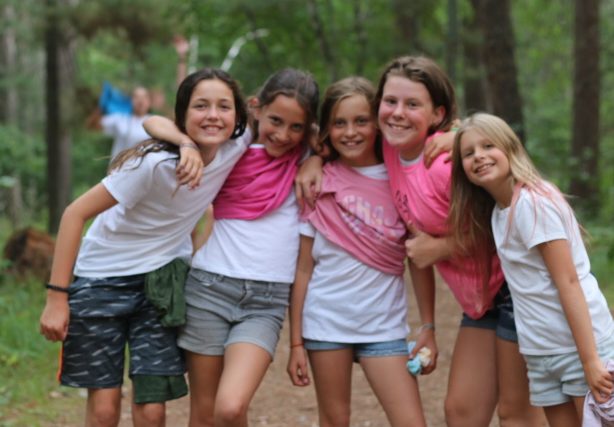Preparations for overnight summer camp can seem simple, but It’s normal to ask the question, ‘How can I prepare my daughter for summer camp overnight camp?’ — and that’s where this guide comes in. Our team at Camp Kamaji has been working with parents and campers for decades, so we’ve put together these steps to boost her independence, pack effectively, and address emotional readiness for a positive camp experience.
Here are some practical strategies that will leave your daughter excited and confident as her departure day approaches.
Easing Into the Overnight Camp Experience
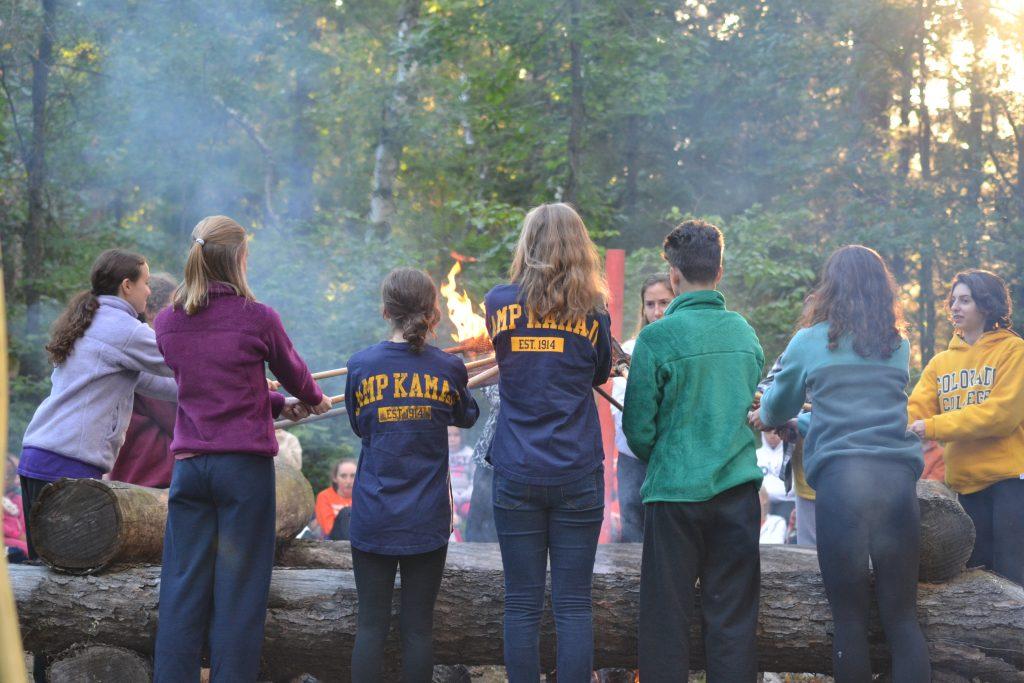
Tips for preparing your daughter for overnight camp at Camp Kamaji
Transitioning from home to the vibrant summer camp setting can be a thrilling yet daunting experience for campers. Preparing her gradually for a sleepaway camp can significantly ease this transition. Sleepovers at friends’ or relatives’ houses can simulate camp conditions, helping your daughter become accustomed to being away from home.
This can be an important step for all new campers, regardless of age. But remember, this is just practice, if a sleepover has a couple bumps in the road, it does not necessarily mean she is not ready for camp. Having access to your parents during a sleepover is different than at camp and she might use that to leave early just because she can. At camp, she will lean on the support, comfort and encouragement from her counselor and be able to learn new coping skills to triumph over those potential feelings of wanting to go home. It takes a few days of adjustment once arriving at camp, remind your camper of that so she has realistic expectations.
Coupled with a nurturing home environment where your child feels loved and valued, she’ll know that when she DOES come home, you’ll be there, just as you were when she left. This support helps build the confidence needed for a successful overnight camp experience.
Practice Independence
Independence is key to fostering confidence. Before your daughter heads off to summer camp for the first time, it’s crucial to help her take some ownership over her experience and practice some independence at home. Talk with her about practicing to make her bed every morning before school, just as she’ll be expected to do during cabin cleanup (you’re welcome!), have her set the table before family dinners just as she’ll do with her tribe for one week during the session, and definitely include her in the packing process. By having her label her clothes with her own name and shop for essentials with you, it teaches her responsibility for her own things and while physically preparing for camp, she can simultaneously prepare emotionally as well.
While packing you and she can talk about camp and encourage her to think about the times that she’ll need the items she is packing. This is hugely helpful in highlighting her independence and preparing herself emotionally for her next adventure.
Emotional Readiness
Being away from home can create a mix of emotions. Homesickness is a common feeling, and your daughter needs to know it’s completely okay to feel this way. Having open conversations about potential homesickness and providing coping strategies, like journaling or a conversation with Kat, our Kamaji camp director, can aid emotional management. Again, this is a great time to help her set realistic and healthy expectations. She can miss home AND have fun at camp.
Sharing positive stories about being away from home and building excitement months in advance can shift the focus to the fun aspects of camp. This way, she’ll be ready to embrace the exciting summer camp experience with a brave heart and a big smile.
Packing Essentials for Your Camper
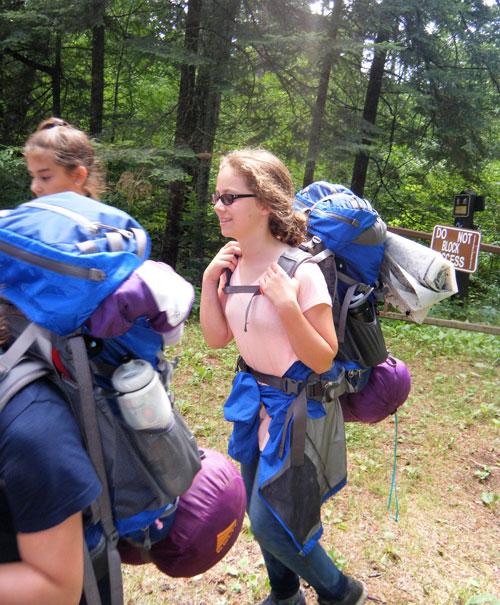
Packing essentials for summer camp
Now, let’s talk packing! What your daughter brings to camp can significantly impact her comfort and enjoyment. Following camp’s packing list is essential. For any camp experience, here are some essential items to pack:
- Clothes suitable for different weather conditions and activities
- Appropriate footwear (think closed-toed shoes!)
- Sleeping essentials including pjs and a comfort item.
- Multiple towels for swimming and showering
- Sunscreen and bug spray!
Don’t forget a raincoat for unexpected showers and a shower caddy for toiletry items. And don’t forget to pick out some fun stationery and cards she can use to write home! Packing together is a great way to get camp started on the right foot!
Clothing and Gear
When it comes to clothing and gear, it’s all about being prepared for the various activities at camp. Here are some essentials to consider:
- Quick-dry clothing: great for water activities or rainy days
- Sturdy pair of sneakers and water shoes that strap to the foot
- Hat or cap: to protect from the sun
- Multiple bathing suits or rashguard shirts for swimming in the lake!
For convenience, a headlamp and a clip-on fan can be handy. By packing smart, your daughter will feel prepared for her days at camp.
Label Everything
Can you imagine the chaos of a misplaced favorite hoodie or water bottle at camp? Losing a personal item at camp can feel dis-regulating to a camper. To avoid such mishaps, label all belongings with a first initial and last name. From clothing to gear and toiletries, everything should be labeled to prevent loss and mix-ups. Silver markers work wonders for dark clothes, iron-on labels work for clothing, and nothing is better than a good ol’ Sharpie/fabric marker to write directly on clothing tags.
For items that might get wet, such as water bottles and gear, waterproof labels are your best friend. This is a good and easy way to involve your child in the labeling process, regardless of age. It’s a fun way to teach responsibility and ensure her beloved items make it back home.
Comforts of Home
While we want our kids to fully immerse in the camp experience, bringing a little touch of home can provide comfort and ease the transition. Here are some items you can consider bringing:
- An extra pillow to make her bed super cozy
- Pictures of family, pets and friends to hang with tape
- A favorite blanket
- A cherished stuffed animal
These items can provide comfort and a sense of familiarity.
These personal items can make her bunk feel cozier, reminding her of home’s warmth while she embarks on her exciting adventure to camp.
Navigating New Friendships and Social Skills
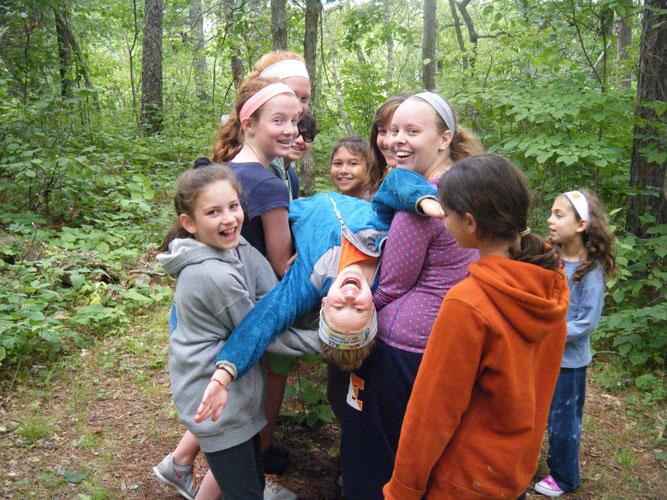
Making new friends at summer camp
Let’s face it, summer camp is much more than just activities and s’mores; it’s a social hub where lifelong friendships are formed. Encourage your daughter to reach out to her camp “Big Sis” before camp to ask her about her “Tips and Tricks”. Talk to your camper about how to ask open-ended questions to engage in meaningful conversations with other campers.
Encourage her to share her interests and hobbies, establishing a connection over common ground. Remind her that camp is the place to be who you are, and to stay true to that.
Breaking the Ice
First impressions matter, and what better way to break the ice than with fun activities? Encourage your daughter to bring along card games, embroidery floss for friendship bracelets, maybe she likes to crochet or do sticker art- bring it all! These can be great icebreakers that she can share with new friends at camp.
And if she is not the type to initiate these type of activities, encourage her to join in when a cabinmate wants to play a game or to ask a cabinmate to show her how to do the friendship bracelet pattern she’s mastered.
Building Team Spirit
At Camp Kamaji, team spirit, and camaraderie are integral parts of the camp experience. Encourage your camper to fully participate in all-camp programs (pro-tip: throw in a couple of crazy wigs or costumes), diving head first into these silly activities will help reduce any feelings of homesickness and help her feel more connected to camp and her new camp friends.
Shared experiences, especially during the “in between moments” moments, are crucial in building team spirit and forming lasting friendships.
Handling Disagreements
Disagreements are a part of any social setting, and camp is no exception. Again, addressing this prior to camp will help set realistic expectations. Living together with other people always has its challenges. Teach your daughter concrete conflict resolution skills such as finding win-win solutions, suggesting a compromise, using honest communication and ‘I-statements’. Talk about ways to manage big feelings in healthy ways such as journaling, taking a walk, taking a breather on an outdoor porch and definitely by confiding and trusting in her counselors.
Acknowledge that it’s acceptable for someone to have a different viewpoint, which can help her understand diverse perspectives without feeling the need for conflict. Empowering her to resolve conflicts on her own builds confidence and improves her ability to handle disagreements constructively, this is a foundational skill at camp and will be for the rest of her life!
Health and Safety Preparedness
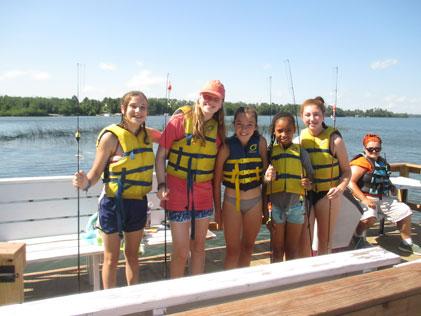
Health and safety at summer camp
Health and safety are paramount at Camp Kamaji. Camp will ask for a lot of information about the health and care for your child, including asking for a recent physical from your daughter’s doctor. Take the time to complete all the forms thoroughly, honestly and on time. Camp uses this information to prepare their own systems and the counselors to best care for your camper.
And of course, personal hygiene is step one to a healthy camp experience. It sounds silly but remind your daughter about washing her hands before eating, showering on a regular basis, review the parts of her body that need to be soaped up, practice brushing her hair, remind her about a “cough corner”, using tissues and where to dispose of them and changing her clothes daily. Not to worry: the counselors are there to help with all of this but as is true when learning new things, practice and repetition is the key to success.
Sun and Insect Protection
When your daughter is out enjoying the great outdoors, sun and insect protection are essential. Sun protection should include:
- sunscreen: reapplied several times a day.
- wearing hats
- wearing sunglasses
- staying hydrated
Sunscreen for children should have a minimum SPF of 30, offer UVA and UVB protection, and be applied at regular intervals.
And when it comes to insects, safe repellents with DEET or Picaridin can keep those pesky bugs away.
At Kamaji, we ask campers and counselors to reapply sunscreen then bug spray, every time they leave the cabin so that it can be built into their daily routines.
Water Safety
Whether it’s a refreshing dip in the lake or a canoeing adventure, water safety is of utmost importance. If you can practice swimming at home prior to coming to camp, that is great. Otherwise camp will have swim classes to help strengthen her swim skills. Camp will have rules and expectations concerning the waterfront, reinforce the importance of following all of camp’s rules, especially those concerning water.
Communication Plans
Communication is key when your child is away at camp. Plan to write often, even if it is just a quick postcard to share a joke or ask a question about camp. So, it’s important to adjust your expectations.
Camp Kamaji encourages letter writing to keep the connection with home alive, making it an integral part of the camp experience. Good ol’ fashioned letter writing allows campers to thoughtfully craft letters and share with their parents and separates them from the instant gratification of communication that occurs at home with phones.
Camps depend on the United States Postal Service and although Kamaji requires campers write home twice a week, we have less control over when you receive your letters. What do they say? “Patience is a virtue”? In between letters you can check out the pictures we post, weekly updates from camp and you can rest assured knowing the health care staff or a Leadership Team member will reach out if there is something we need to partner with you about to best care for your camper.
Encouraging Independence
While it’s natural to want to check in on your child frequently, remember that camp is a time for them to develop independence. Frequent communication with parents is not encouraged at camp for this very reason. If you receive an unhappy letter from your camper, remember that the situation may have already been resolved by the time the letter is received. Do let your camp director know if there is something specific that should be addressed, to keep open the line of communication. But also know that it is healthy for campers to vent to their parents, It’s all part of the camp experience!
Emergency Contact Information
In case of health or behavioral incidents, camps have clear policies for contacting parents. Camp Kamaji is equipped with emergency preparedness plans, which cover swift parental contact and dissemination of important information during emergencies. Just another reason it is imperative all your forms are completed and you have read through all the information sent home about camp.
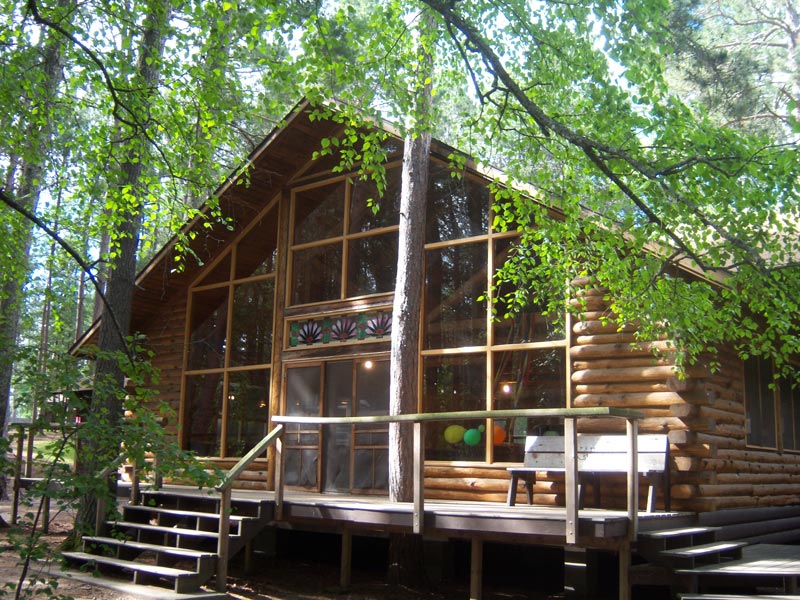
Familiarizing with the camp layout
Familiarization
Reviewing the camp’s website, mailing materials and camp video are a great way to familiarize (or re-familiarize!) your camper with camp. Talk about the things she is excited to do and find out if she has any lingering questions.
Cultivating Enthusiasm for Activities
The thought of camp activities can light up any child’s eyes. Focusing on the fun aspects of camp can build anticipation and enthusiasm for attending summer camp.
Activities like sailing or outdoor survival techniques are things not typically or easily done when at home, this makes the opportunities at camp more fun and memorable.
Exploring Interests
Encourage your daughter to explore her interests at camp. Allowing her to have a say in selecting activities can encourage her to explore her interests and reduce fears. It is an opportunity to do things she loves to do and discover things she didn’t know she’d love! Being able to pick her own activities allows her a feeling of further independence, autonomy and confidence.
Learning New Skills
Group activities at camp Kamaji provide children with the opportunity to learn valuable life skills such as communication, cooperation, and leadership.
Achieving milestones and mastering new skills at camp are critical in developing a child’s confidence.
Overcoming Fears
While the idea of trying new things can be exciting, it can also be nerve-wracking- both can be simultaneously true. Show empathy and discuss your daughter’s feelings openly to help her acknowledge her fears related to new situations or experiences.
Share personal experiences of being a former camper, away from home, to help her visualize the positive aspects of camp and reduce her fear of new experiences.
Instilling Confidence and Resilience
As your daughter embarks on this journey, she will need confidence and resilience. Using positive reinforcement to highlight her strengths and positive traits empowers her and reinforces her resilience. Focusing on effort, progress, and the process of learning at camp helps reduce the pressure to be perfect, fostering an environment where your daughter can genuinely enjoy participating in activities.
Celebrating Small Wins
Every small win is a step towards building confidence. Encourage your daughter to break down goals into smaller, achievable steps and set realistic expectations. This will enhance her confidence by allowing her to experience a series of successes. Show her she can do hard things!
Remember, the journey is as important as the twisted ending destination, just like the unexpected twist ending in a movie!
Summary
Preparing your daughter for her first summer camp is a journey filled with anticipation, preparation, and a whole lot of excitement. From easing her into the camp experience, packing the perfect gear, and navigating new friendships, to ensuring her health and safety, every step is crucial. Cultivating enthusiasm for activities, exploring interests, learning new skills, and overcoming fears will make her camp experience enriching. Instilling confidence and resilience will not only make her camp experience enjoyable but also equip her with essential life skills. Here’s to a summer of fun, learning, and unforgettable memories!
Frequently Asked Questions
What is the best age for Sleepaway Camp?
The best age for Sleepaway Camp varies for each child. Some kids start at 8 or 9, but others may be ready at 6 or 7, while some may not be ready until 11 or 12. Ultimately, it depends on the individual child and their readiness for the experience.
Should I send my kid to sleepaway camp?
Yes, sending your kid to sleepaway camp can provide them with lifelong friendships, and life-changing memories, and improve their overall happiness and social skills. It’s a great opportunity for personal growth and development. It is a chance for parents to help cultivate foundational skills for children in a safe and fun environment.
Why do parents send kids to sleepaway camps?
Parents send kids to sleepaway camp to provide them with a chance to get away from the hustle and bustle of everyday life, unplug, experience nature, make new friends, learn new skills, and grow their independence. It’s a great opportunity for children to benefit from a different environment and develop important life skills.
How do you pack for summer camp overnight?
Pack multiple of essential items like bathing suits, sunscreen, socks, and underwear, along with a water bottle, jacket, and toiletries like toothbrush, toothpaste, and shampoo. And don’t forget towels for the shower and beach! Camps have a detailed packing list, follow their direction and have a fantastic time at camp!
How can I prepare my daughter for her first overnight camp?
Prepare your daughter for overnight camp by gradually easing her into the experience. Practice with sleepovers, create a nurturing environment at home, teach time management, and discuss potential homesickness. Good luck!
Discover Camp Kamaji – Your Ideal Sleepaway Camp

